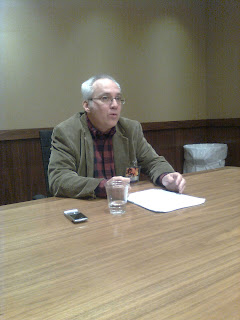* The winner of the Best Novel award is "The Unincorporated Man", by Dani and Eytan Kollin (TOR Books). The Hall of Fame award was won by "No Truce with Kings," a story by Poul Anderson, written in 1964. The Kollin Brothers will each receive a plaque and a one-ounce gold coin, while a smaller gold coin and a plaque will be presented to Anderson's estate.
"The Unincorporated Man" is the first novel publication by the Kollin brothers. It is the first novel in a planned trilogy to be published by Tor. "The Unincorporated Man" presents the idea that education and personal development could be funded by allowing investors to take a share of one's future income. The novel explores the ways this arrangement would affect those who do not own a majority of the stock in themselves. For instance, often ones investors would have control of a person's choices of where to live or work. The desire for power as an end unto itself and the negative consequences of the raw lust for power are shown in often great detail. The story takes a strong position that liberty is important and worth fighting for, and the characters spend their time pushing for different conceptions of what freedom is.
Poul Anderson's novels have been nominated many times, and have won the Prometheus Award (in 1995, for "The Stars are also Fire"), and the Hall of Fame Award (1995 for "The Star Fox" and 1985 for "Trader to the Stars"). He also received a Special award for lifetime achievement in 2001. This was the first nomination for "No Truce With Kings".
Poul Anderson's "No Truce with Kings" was first published in 1963. Like many science fiction stories of that era, it was set in a future that had endured a nuclear war. Anderson's focus is not on the immediate disaster and the struggle to survive, but the later rebuilding; its central conflict is over what sort of civilization should be created. The story's title comes from Rudyard Kipling's poem "The Old Issue," which describes the struggle to bind kings and states with law and the threat of their breaking free. Anderson's future California is basically a feudal society, founded on local loyalties, but it has a growing movement in favor of a centralized, impersonal state. As David Friedman remarked about this story, Anderson plays fair with his conflicting forces: both of them want the best for humanity, but one side is mistaken about what that is. This story is classic Anderson and, like many of his best stories, reveals his libertarian sympathies.
The other finalists for Best Novel were Hidden Empire, by Orson Scott Card (TOR Books); Makers, by Cory Doctorow (TOR Books); Liberating Atlantis, by Harry Turtledove (ROC/Penguin Books); and The United States of Atlantis, by Harry Turtledove (ROC/Penguin Books). Eleven novels published in 2009 were nominated for the 2010 award.
The other finalists for the Hall of Fame award were "As Easy as A.B.C.," a story by Rudyard Kipling (1912); Cryptonomicon, a novel by Neal Stephenson (1999); and "'Repent, Harlequin!' Said the Ticktockman," a story by Harlan Ellison (1965).
The LFS is announcing the winning works so that fans of the works and the writers can begin to make plans for attending the awards ceremonies. Anyone interested in more information about the awards ceremony or other LFS activities at Aussicon 4 can send email toprogramming@lfs.org.
The Prometheus awards for Best Novel, Best Classic Fiction (Hall of Fame) and (occasional) Special awards honor outstanding science fiction/fantasy that explores the possibilities of a free future, champions human rights (including personal and economic liberty), dramatizes the perennial conflict between individuals and coercive governments, or critiques the tragic consequences of abuse of power--especially by the State.
The Prometheus Award, sponsored by the Libertarian Futurist Society (lfs.org), was established in 1979, making it one of the most enduring awards after the Nebula and Hugo awards, and one of the oldest fan-based awards currently in sf. Presented annually since 1982 at the World Science Fiction Convention, the Prometheus Awards include a gold coin and plaque for each of the winners.
The Hall of Fame, established in 1983, focuses on older classic fiction, including novels, novellas, short stories, poems and plays. Past Hall of Fame award winners range from Robert Heinlein and Ayn Rand to Ray Bradbury and Ursula LeGuin.
Publishers who wish to submit novels published in 2009 for the 2010 Best Novel award should contact Michael Grossberg, Chair of the LFSPrometheus Awards Best Novel Finalist judging committee online atmikegrossb@aol.com or on paper at 3164 Plymouth Place, Columbus OH 43213.
Founded in 1982, the Libertarian Futurist Society sponsors the annualPrometheus Award and Prometheus Hall of Fame; publishes reviews, news and columns in the quarterly "Prometheus"; arranges annual awards ceremonies at the WorldCon; debates libertarian futurist issues (such as private space exploration); and provides fun and fellowship for libertarian SF fans.
A list of past winners of LFS awards can be found on the LFS web site at www.lfs.org.



